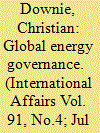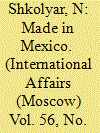| Srl | Item |
| 1 |
ID:
124092


|
|
|
|
|
| Publication |
2013.
|
| Summary/Abstract |
In November 2010, the G20 Summit was held in Seoul. The G20 has increasingly replaced the G8 as being the premier forum for international economic cooperation, but in November 2010, it was the first time that a summit was held in country that was not a G8 member. It was by the Korean government seen as evidence of the country finally having achieved the goal of becoming an advanced nation playing, while still constrained by the division of the peninsula, a global role in line with its economic standing. The article argues that this has been a constant theme in Korea's foreign policy since it was originally formulated in 1994 as part of the country's globalization policy. This addition of an intentional dimension, to the objective capabilities created during the previous decades, has increasingly resulted in the type of behavior associated with middle power status.
|
|
|
|
|
|
|
|
|
|
|
|
|
|
|
|
| 2 |
ID:
140271


|
|
|
|
|
| Summary/Abstract |
It is widely accepted that the rising power of the BRIC countries—Brazil, Russia, India and China—has the potential to re-shape the international system. However, little attention has been given to the BRICs’ role in a growing area of strategic importance: global energy governance. While global governance scholars now argue that the international energy architecture requires substantive reform to keep pace with the rapid transformations in global energy markets, largely driven by the BRICs, it is not clear what role these countries will play in future governance arrangements. Drawing on recent scholarship in global governance and international negotiations, interviews with G20 energy officials, and the observations of the author, a past delegate to G20 negotiations, this article examines whether the BRICs as a coalition have the capacity and willingness to drive substantive global energy governance reform. In doing so, it highlights the problems with the BRICs as a coalition on energy and considers the prospects for energy reform in light of China's increasing engagement with energy governance ahead of it hosting the G20 Summit in 2016.
|
|
|
|
|
|
|
|
|
|
|
|
|
|
|
|
| 3 |
ID:
100709


|
|
|
|
|
| Publication |
2010.
|
| Summary/Abstract |
THE WORLD FINANCIAL and economic crisis has brought out the great interdependence of national economies under globalization conditions. Russia's President Dmitry Medvedev has noted that under the circumstances "we all become hostages to changes in the macroeconomic parameters of the world's largest economies. In order to see this coming well in advance, we must commit ourselves to studying the situations in our respective countries."1 The idea for mutual monitoring of the state of affairs in national economies was one of the important decisions of the G20 Summit in Pittsburgh in September 2009.
|
|
|
|
|
|
|
|
|
|
|
|
|
|
|
|